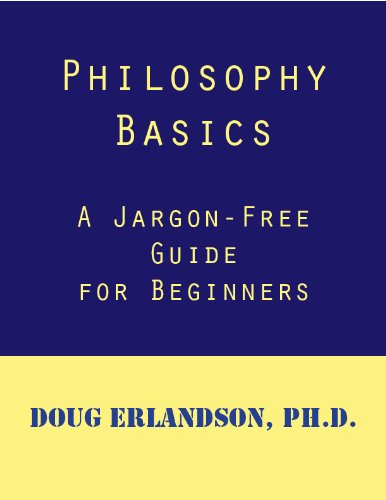Philosophy Basics: A Jargon-Free Guide for Beginners Review


In Philosophy Basics: A Jargon-Free Guide for Beginners, Dr. Doug Erlandson provides an easy-to-understand general introduction to philosophy. Its simple and non-technical style covers the major topics in philosophy in a way that even someone with no familiarity with philosophy will be able to understand.
Philosophy Basics has grown out of Dr. Erlandson’s twenty-five years of teaching philosophy, eight at the University of Nebraska Lincoln and an additional seventeen at Southeast Community College in Lincoln. Early on he realized that his students would benefit from having a written outline to help them better understand his lectures.
As he notes in the Preface to Philosophy Basics, “what at first was an outline soon became a written summary of these lectures. With each new edition this written summary continued to expand, and over time it took on more and more of the characteristics of a basic introductory philosophy text.” In preparing that summary for a general audience, Erlandson has extensively revised and clarified the material so that the book provides the reader with a self-contained introduction, one that does not depend on listening to a professor’s lectures for explanation or clarification.
Philosophy Basics begins with a brief introduction that defines what philosophy is, describes the major areas of philosophy, and discusses the value and limitations of philosophy. Following this is a section on logic and critical thinking, which includes a discussion of various fallacies and how to avoid them. The section on the theory of knowledge investigates the issue of knowledge and doubt, the origin of knowledge, and the relationship between the mind and the external world. This last topic provides a transition into the philosophy of mind, in which Erlandson presents the views that philosophers have held regarding our knowledge of other minds, the relationship between the mind and the brain, and the age-old problem of causal determinism and human free will.
The section on moral philosophy or ethics begins with a discussion of the difference between the ethics of duty and the ethics of consequences, after which it examines various types of moral relativism (subjectivism, cultural relativism, and situationism) and moral objectivism (intuitionism, good-reasons ethics, Kantianism, and utilitarianism). This section concludes with a discussion of religious ethics and the issue of the motivation to act ethically.
The last section is on the philosophy of religion. In it Erlandson examines the classical arguments for the existence of God, the various positions philosophers have taken on the possibility of miracles, the problem of evil, and the question of survival of death.
At the conclusion of the discussion of each topic Philosophy Basics provides a set of review questions to aid the reader in better understanding the material.
Although Philosophy Basics is organized topically the text makes frequent reference to the views of individual philosophers past and present. Thus, while not a text in the history of philosophy, the book will provide the reader some familiarity with the great thinkers throughout the ages.
What is the ultimate goal of Philosophy Basics? Once again from the preface: “ My hope is that this book will generate enough excitement for philosophy in the reader that he or she will be encouraged to probe these issues in more depth and will continue on in the study of philosophy. For, to the extent that my opinion counts, the study of philosophy is rewarding not only because it serves to sharpen the mind (which it does) but also because it leads its student to a more profound understanding of the world and also (I hope) to a genuine sense of humility as we see how much more there is to know and how little understanding even the greatest minds possess.”













